All products and services are For Research Use Only and CANNOT be used in the treatment or diagnosis of disease.
Based on extensive background knowledge and practical capabilities in the field of HAVCR2 CAR T, Creative Biolabs offers a range of HAVCR2 CAR products. You can filter the keywords below to find the product you need.
As a transmembrane protein, HAVCR2 is characterized by CD4+ helper T cells and CD8+ cytotoxic T cells, as well as structurally expressed on Treg cell subsets. HAVCR2 is considered to be an IR that simultaneously controls both antiviral and antitumor immunity. It is expressed on dysfunctional T cells and has been associated with poor prognosis in a variety of cancers, including melanoma and non-small cell lung cancer (NSCLC). Upregulation of HAVCR2 in mature natural killer cells typically induces the release of cytokines IL-12, IL-15, and/or IL-18 and increases cytotoxicity in tumor cells.
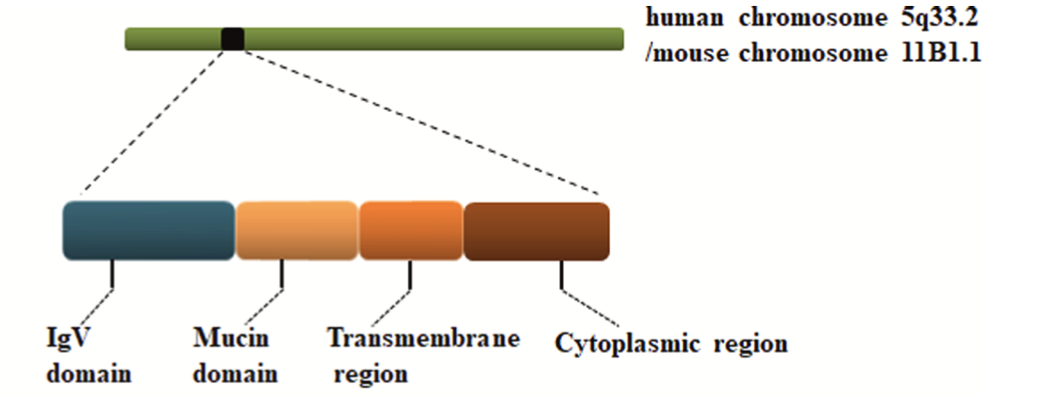 Fig.1 Schematic diagram of the HAVCR2 molecule.1
Fig.1 Schematic diagram of the HAVCR2 molecule.1
Non-small Cell Lung Cancer
Hemophagocytic Syndrome
Late-onset Sporadic Alzheimer's Disease
Creative Biolabs provides complete and high-quality CAR construction services to meet your different research needs. We offer not only classic CAR designs but also many different special CAR designs. You can click here to learn more information about CAR Design & Construction.
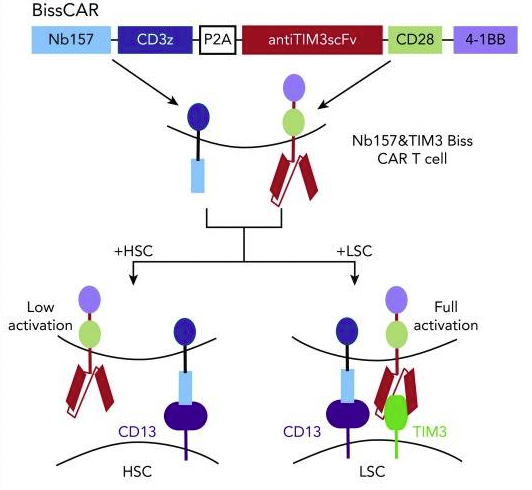 Fig.2 Design and construction of bispecific and split CD13 and HAVCR2.2
Fig.2 Design and construction of bispecific and split CD13 and HAVCR2.2
Anti-HAVCR2 CAR-T Expression Test
Flow cytometry and western blotting are common methods to detect CAR expression and stability. Creative Biolabs offers CAR expression and stability testing services to help you accurately assess CAR expression levels on cells or NK cells.
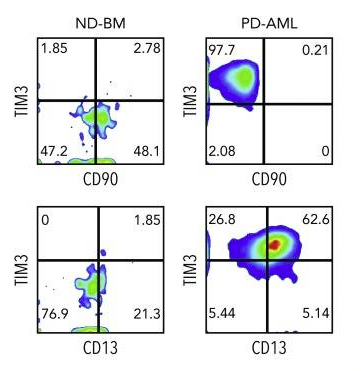 Fig.3 Flow cytometry evaluates the expression levels of HAVCR2 on different cells.2
Fig.3 Flow cytometry evaluates the expression levels of HAVCR2 on different cells.2
Anti-HAVCR2 CAR-T Cell Therapy Animal Models
The selection of suitable animal models is critical in the preclinical study of CAR-T cell therapy. Defining the purpose of the study through animal models and establishing a reasonable efficacy and validation protocol will accelerate your research progress. Creative Biolabs offers in vivo animal models for HAVCR2 CAR-T cell therapy to better accelerate your HAVCR2 CAR-T cell therapy development process.
Efficacy Test of Anti-HAVCR2 CAR-T
Backed by an advanced technology platform and talented scientists, Creative Biolabs offers customized and high-quality HAVCR2 CAR-T in vivo efficacy studies for our customers by providing appropriate animal models. Our in vivo HAVCR2 CAR-T pharmacodynamic study services include but are not limited to flow cytometry, in vivo imaging, clinical observation, etc.
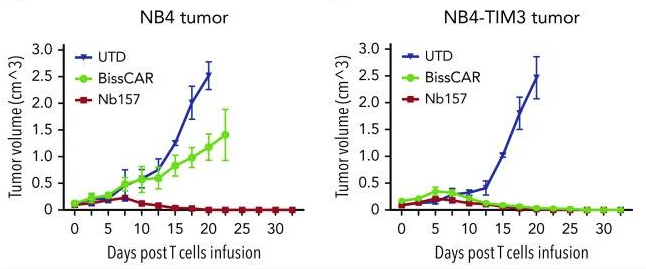 Fig.4 Effect of CD13/HAVCR2 CAR T cells on NSG tumor mice. The results showed that CD13/HAVCR2 CAR T had varying degrees of inhibitory effect on tumor growth.2
Fig.4 Effect of CD13/HAVCR2 CAR T cells on NSG tumor mice. The results showed that CD13/HAVCR2 CAR T had varying degrees of inhibitory effect on tumor growth.2
Toxicity Evaluation Anti-HAVCR2 CAR-T
Creative Biolabs provides various toxicological study services including on-target and off-target toxicity, tumorigenicity studies, and so on. These assessments can characterize risk and inform clinical trial designs.
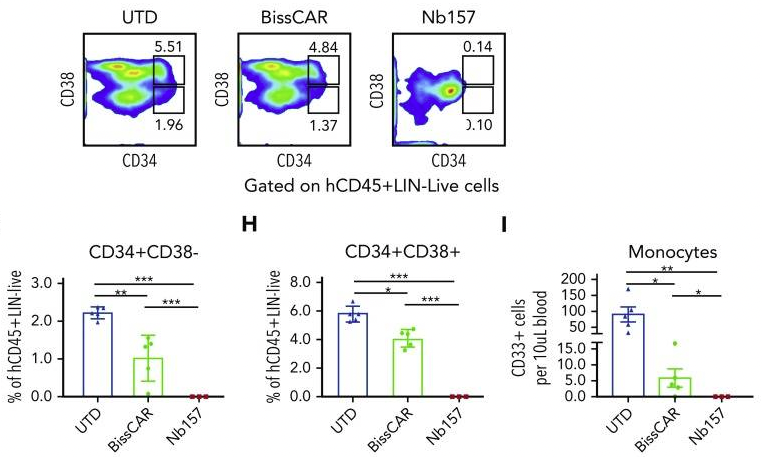 Fig.5 Hematopoietic toxicity of CD13/HAVCR2 CAR T cells in humanized immune system (HIS) mice. The results showed that CD13/HAVCR2 CAR T cells significantly reduced their toxicity to HSCs.2
Fig.5 Hematopoietic toxicity of CD13/HAVCR2 CAR T cells in humanized immune system (HIS) mice. The results showed that CD13/HAVCR2 CAR T cells significantly reduced their toxicity to HSCs.2
References
 Loading...
Loading...
| CAT | Product Name | Target Species | Antibody Clone | Antibody Host | Receptor Construction | Vector Type | Targeting Cell Type | CAR Vector Type | Inquiry & Datasheet |
| CAR-ZP5481 | Anti-HAVCR2 (G49-3F3) h(CD28-CD3ζ) CAR, pCDCAR1 | Human | G49-3F3 | Mouse | scFv-CD28-CD3ζ | Lentiviral vector | T cell | ||
| CAR-ZP5482 | Anti-HAVCR2 (G49-3F3) h(41BB-CD3ζ) CAR, pCDCAR1 | Human | G49-3F3 | Mouse | scFv-41BB-CD3ζ | Lentiviral vector | T cell | ||
| CAR-ZP5483 | Anti-HAVCR2 (Tim3_0016) h(CD28-CD3ζ) CAR, pCDCAR1 | Human | Tim3_0016 | Mouse | scFv-CD28-CD3ζ | Lentiviral vector | T cell | ||
| CAR-ZP5484 | Anti-HAVCR2 (Tim3_0016) h(41BB-CD3ζ) CAR, pCDCAR1 | Human | Tim3_0016 | Mouse | scFv-41BB-CD3ζ | Lentiviral vector | T cell | ||
| CAR-ZP5485 | Anti-HAVCR2 (Tim3_0016MutNQ) h(CD28-CD3ζ) CAR, pCDCAR1 | Human | Tim3_0016MutNQ | Mouse | scFv-CD28-CD3ζ | Lentiviral vector | T cell | ||
| CAR-ZP5486 | Anti-HAVCR2 (Tim3_0016MutNQ) h(41BB-CD3ζ) CAR, pCDCAR1 | Human | Tim3_0016MutNQ | Mouse | scFv-41BB-CD3ζ | Lentiviral vector | T cell | ||
| CAR-ZP5487 | Anti-HAVCR2 (Tim3_0018) h(CD28-CD3ζ) CAR, pCDCAR1 | Human | Tim3_0018 | Mouse | scFv-CD28-CD3ζ | Lentiviral vector | T cell | ||
| CAR-ZP5488 | Anti-HAVCR2 (Tim3_0018) h(41BB-CD3ζ) CAR, pCDCAR1 | Human | Tim3_0018 | Mouse | scFv-41BB-CD3ζ | Lentiviral vector | T cell | ||
| CAR-ZP5489 | Anti-HAVCR2 (ABTIM3) h(CD28-CD3ζ) CAR, pCDCAR1 | Human | ABTIM3 | Mouse | scFv-CD28-CD3ζ | Lentiviral vector | T cell | ||
| CAR-ZP5493 | Anti-HAVCR2 (F38-2E2) h(CD28-CD3ζ) CAR, pCDCAR1 | Human | F38-2E2 | Mouse | scFv-CD28-CD3ζ | Lentiviral vector | T cell | ||
| CAR-ZP5494 | Anti-HAVCR2 (F38-2E2) h(41BB-CD3ζ) CAR, pCDCAR1 | Human | F38-2E2 | Mouse | scFv-41BB-CD3ζ | Lentiviral vector | T cell | ||
| CAR-ZP5495 | Anti-HAVCR2 (7H2) h(CD28-CD3ζ) CAR, pCDCAR1 | Human | 7H2 | Mouse | scFv-CD28-CD3ζ | Lentiviral vector | T cell | ||
| CAR-ZP5496 | Anti-HAVCR2 (7H2) h(41BB-CD3ζ) CAR, pCDCAR1 | Human | 7H2 | Mouse | scFv-41BB-CD3ζ | Lentiviral vector | T cell | ||
| CAR-ZP5497 | Anti-HAVCR2 (8E11) h(CD28-CD3ζ) CAR, pCDCAR1 | Human | 8E11 | Mouse | scFv-CD28-CD3ζ | Lentiviral vector | T cell | ||
| CAR-ZP5557 | Anti-HAVCR2 (mAb15) h(CD28-CD3ζ) CAR, pCDCAR1 | Human | mAb15 | Mouse | scFv-CD28-CD3ζ | Lentiviral vector | T cell | ||
| CAR-ZP5558 | Anti-HAVCR2 (mAb15) h(41BB-CD3ζ) CAR, pCDCAR1 | Human | mAb15 | Mouse | scFv-41BB-CD3ζ | Lentiviral vector | T cell | ||
| CAR-ZP5559 | Anti-HAVCR2 (CAR-ZP5559) h(CD28-CD3ζ) CAR, pCDCAR1 | Human | CAR-ZP5559 | Mouse | scFv-CD28-CD3ζ | Lentiviral vector | T cell | ||
| CAR-ZP5560 | Anti-HAVCR2 (CAR-ZP5560) h(41BB-CD3ζ) CAR, pCDCAR1 | Human | CAR-ZP5560 | Mouse | scFv-41BB-CD3ζ | Lentiviral vector | T cell | ||
| CAR-ZP5561 | Anti-HAVCR2 (TSR-022) h(CD28-CD3ζ) CAR, pCDCAR1 | Human | TSR-022 | Human | scFv-CD28-CD3ζ | Lentiviral vector | T cell | ||
| CAR-ZP5562 | Anti-HAVCR2 (TSR-022) h(41BB-CD3ζ) CAR, pCDCAR1 | Human | TSR-022 | Human | scFv-41BB-CD3ζ | Lentiviral vector | T cell |
 NEWSLETTER
NEWSLETTER
The latest newsletter to introduce the latest breaking information, our site updates, field and other scientific news, important events, and insights from industry leaders
LEARN MORE NEWSLETTER NEW SOLUTION
NEW SOLUTION
CellRapeutics™ In Vivo Cell Engineering: One-stop in vivo T/B/NK cell and macrophage engineering services covering vectors construction to function verification.
LEARN MORE SOLUTION NOVEL TECHNOLOGY
NOVEL TECHNOLOGY
Silence™ CAR-T Cell: A novel platform to enhance CAR-T cell immunotherapy by combining RNAi technology to suppress genes that may impede CAR functionality.
LEARN MORE NOVEL TECHNOLOGY NEW SOLUTION
NEW SOLUTION
Canine CAR-T Therapy Development: From early target discovery, CAR design and construction, cell culture, and transfection, to in vitro and in vivo function validation.
LEARN MORE SOLUTION